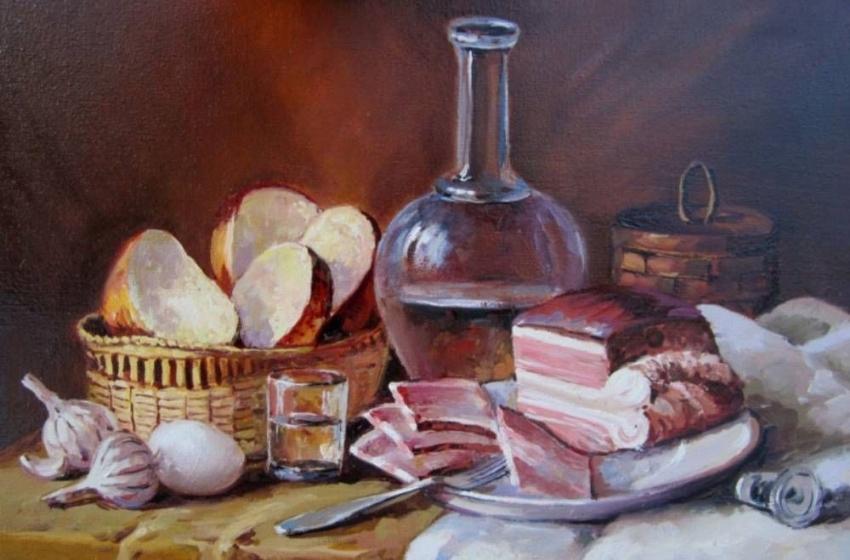The myth that Ukrainians the first eaters of lard was shattered in 2012. A survey was conducted among representatives of 16 countries participating in Euro 2012 on their taste preferences, and then the data of the European Union and the UN on the cultivation and consumption of a variety of agricultural products were also analysed. It turned out that Ukrainians are not the leaders in eating salo: they are only in 13th position. In general, pork is eaten about 50 g per day.
Lard is actually very popular among many nations. For example, Belarusians use "sala", Germans use "speck", Balkan Slavs use "slanina", Poles use "slonina", Americans use "fatback", etc. And Italians know how to make their national gastronomic masterpieces out of lard, such as "Lardo di Colonnata" or "Valle d'Aosta Lardo".
The main consumers of salo today live in ... Denmark! Germany is in second place, France is in third place.
It is believed that interest in lard in Ukraine increased in the 16th century, when Tatars and Turks from the Ottoman Empire raided Slavic territories more often. So that the muslims did not take away at least cattle, the Cossacks came up with a trick: they took advantage of the religious peculiarities of the gastronomic preferences of the attacking Muslims, and began to breed almost only piglets. The robbers' interest did not extend to them: according to the Koran, pork meat is considered unclean and is prohibited for consumption.
So, salo also became popular. Surviving without cows and sheep required large amounts of meat, and salo was excellently stored. Ukrainians even rubbed other products with it, so that the smell of pork scared off the invaders. Even special lard canvases were made. By hanging this in front of the cellar, the Ukrainian could guarantee to protect his cellar with food from the invasion of Muslims. As a result, even after the Tatar raids, salo remained a symbol of Ukrainian cuisine.
Since ancient times, archaeological finds related to this product - the bones of a wild boar - have reached us. In the minds of primitive people, the boar was the embodiment of gravity, courage, strength and courage. And, although he was hunted for survival, he was respected, painted, worshiped.
Archeology testifies to the fact that already in the third millennium BC, the ancient Ukrainians raised pigs. The Trypillians, who lived on a significant part of modern Ukrainian lands, had a domestic pig among the cult animals.
During the choice of a new faith in Russia, one of the arguments of Prince Vladimir in favor of Christianity was that it did not forbid the consumption of pork.
For the ability to add strength during a long journey for salt, lard was very much appreciated by the Chumaks.
It is difficult to imagine a Cossack who, along with weapons, gunpowder, tobacco and salt, would not have kept with him a piece of salo for a snack or for preparing a delicious kulesh - the traditional food of the steppe heroes.

Salo is considered ideal with a thickness of 4 cm, from 2.5 to 5 cm - suitable. Less than 2.5 cm and more than 5 cm are usually discarded and used for other dishes, but not for pickling.
Fresh salo, onions, garlic, cucumber and rye bread have always been the best way for a Ukrainian to have a snack while fishing or during the long trip.
There is a Salo Days celebrated on August 27 in Ukraine. In L'viv there is a restaurant-museum of salo with the same name "Salo". There you can see sculptures and compositions from salo, paintings and much more.
It is believed that Columbus was able to get to America due to the fact that among the supplies he had a lot of hams and lard (salo), which can be stored for up to six months, contains many calories, and these calories are long-lasting. It is restored for a long time, the calorie content of the product is 770 kcal per 100 g. So salo made its invaluable contribution to world history - after all, Columbus would not have discovered America, and we would not have a tomato, and without a tomato we cannot cook borscht, and without borscht - what kind of culture is this ?!
Skiers rubbed their skis with salo so that they glide better. Special pastes and coatings appeared much later.
Once upon a time salo was used as ... bookmarks for books!
Salo in chocolate is not an dream. Sweets with such a name are produced in Ukraine and are in great demand among tourists.

Emperor Justinian passed a law ordering the supply of salo to the army for the Roman legionnaires.
The people of the Middle Ages ate salo in large quantities. Saint Benedict himself, the founder of the Benedictine order, allowed the monks to eat salo. The monks said that "salo and pig are as connected to each other as the grape and wine."

Salo was not only eaten - in the Middle Ages they also made candles from it. They didn’t smell very good, they smoked, but they still gave light.
Salo is used for cooking, vegetables are fried and stewed on, it is added to porridge. Salo could be salted, boiled, smoked.

Salo, together with garlic, is an excellent duet: it is used to prevent diseases of blood vessels, heart and liver.
Salo or lard, like pork, is prohibited for representatives of some religious groups, such as Muslims and Jews.
To eat salo on an empty stomach - not only has bad taste, but also harm to the body: an incredible load is created for the pancreas, which leads to very unpleasant symptoms.
Salo is used in toxicology as a means to cleanse the body of toxins, protect against radiation.
In the USSR, members of the Central Committee of the party ate 50 grams of salo daily.
During the Civil War, Siberians fled from the raids of the Reds and Whites, greasing the gate with salo - this smell frightened off the horses.
During the World War II, food in Red army was very tight, as well as with military equipment in principle. The Russian soldiers were saved by three "S": salo, sukhari (crackers) and of course spirt (alcohol).
Salo contains selenium, which is especially useful for athletes, breastfeeding mothers, pregnant women, and smokers.
Salo is a good snack for vodka. Both of these products are high in calories, which means they quickly fill. In addition, salo is the fat that covers the stomach, which ensures the slow, gradual absorption and assimilation of alcohol, which means that it reduces the symptoms of intoxication.
In Chukotka, they eat seal lard (salo), which is very similar in structure and taste to pork salo.
If the salo is soft, oily, it means that the pig was overfed with corn. If the salo is tough, it means that the pig sat hungry for a long time. And the most delicious and dense salo is obtained if the animal ate "pig-like" - acorns.

Earlier, before launching the vessel into the water, its bottom was greased with salo. They did the same with sleds so that they glide easier.
Salo contains a large amount of cholesterol. However, much less than butter, crabs, and shrimp. Therefore, salo is healthier than butter.
At the time of the declaration of independence, there were almost 20 million pigs in Ukraine. Today there are half of them.
The world's only one Salo Museum, which is considered a national Ukrainian product, is open in L'viv at Svobody ave., 6/8. It was opened with sculptures by Taras Bulba, Gogol, paintings and photos dedicated to salo and bacon. An ice cream with salo in chocolate is usually offered there.






















